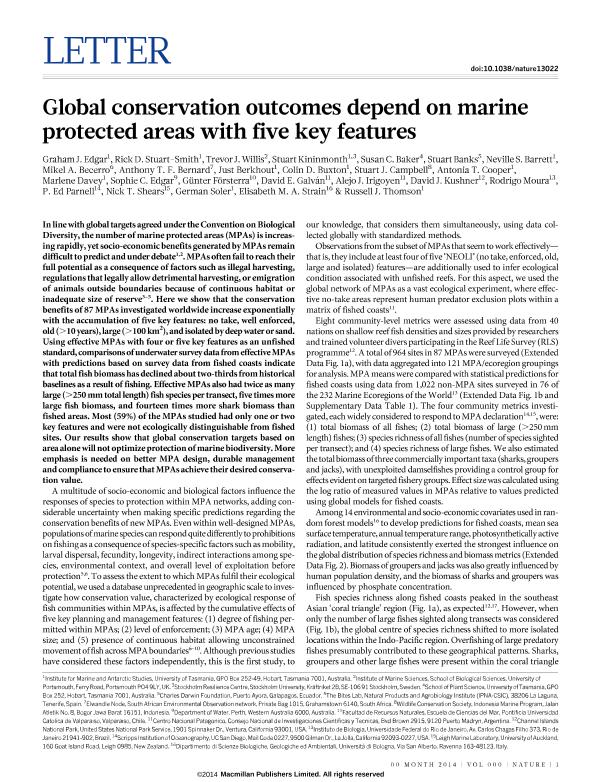Artículo
Global conservation outcomes depend on marine protected areas with five key features
Graham, J. Edgar; Stuart Smith, Rick D.; Willis, Trevor J.; Kininmonth, Stuart; Baker, Susan C.; Banks, Stuart; Barrett, Neville S.; Becerro, Mikel A.; Bernard, Anthony T. F.; Berkhout, Just; Buxton, Colin D.; Campbell, Stuart J.; Cooper, Antonia T.; Davey, Marlene; Edgar, Sophie C.; Försterra, Günter; Galvan, David Edgardo ; Irigoyen, Alejo Joaquin
; Irigoyen, Alejo Joaquin ; Kushner, David J.; Moura, Rodrigo; Parnell, P. Ed; Shears, Nick T.; Soler, German; Strain, Elisabeth M. A.; Thomson, Russell J.
; Kushner, David J.; Moura, Rodrigo; Parnell, P. Ed; Shears, Nick T.; Soler, German; Strain, Elisabeth M. A.; Thomson, Russell J.
 ; Irigoyen, Alejo Joaquin
; Irigoyen, Alejo Joaquin ; Kushner, David J.; Moura, Rodrigo; Parnell, P. Ed; Shears, Nick T.; Soler, German; Strain, Elisabeth M. A.; Thomson, Russell J.
; Kushner, David J.; Moura, Rodrigo; Parnell, P. Ed; Shears, Nick T.; Soler, German; Strain, Elisabeth M. A.; Thomson, Russell J.
Fecha de publicación:
05/02/2014
Editorial:
Nature Publishing Group
Revista:
Nature
ISSN:
0028-0836
Idioma:
Inglés
Tipo de recurso:
Artículo publicado
Clasificación temática:
Resumen
In line with global targets agreed under the Convention on Biological Diversity, the number of marine protected areas (MPAs) is increasing rapidly, yet socio-economic benefits generated by MPAs remain difficult to predict and under debate. MPAs often fail to reach their full potential as a consequence of factors such as illegal harvesting, regulations that legally allow detrimental harvesting, or emigration of animals outside boundaries because of continuous habitat or inadequate size of reserve. Here we show that the conservation benefits of 87 MPAs investigated worldwide increase exponentially with the accumulation of five key features: no take, well enforced, old (>10 years), large (>100km2), and isolated by deep water or sand. Using effective MPAs with four or five key features as an unfished standard, comparisons of underwater survey data from effective MPAs with predictions based on survey data from fished coasts indicate that total fish biomass has declined about two-thirds from historical baselines as a result of fishing. Effective MPAs also had twice as many large (>250mm total length) fish species per transect, five timesmore large fish biomass, and fourteen times more shark biomass than fished areas. Most (59%) of the MPAs studied had only one or two key features and were not ecologically distinguishable from fished sites. Our results show that global conservation targets based on area alone will not optimize protection of marine biodiversity. More emphasis is needed on better MPA design, durable management and compliance to ensure that MPAs achieve their desired conservation value.
Palabras clave:
Marine Protected Areas
,
Reef
,
Marine Conservation
,
Biodiversity
Archivos asociados
Licencia
Identificadores
Colecciones
Articulos(CCT-CENPAT)
Articulos de CTRO.CIENTIFICO TECNOL.CONICET - CENPAT
Articulos de CTRO.CIENTIFICO TECNOL.CONICET - CENPAT
Citación
Graham, J. Edgar; Stuart Smith, Rick D.; Willis, Trevor J.; Kininmonth, Stuart; Baker, Susan C.; et al.; Global conservation outcomes depend on marine protected areas with five key features; Nature Publishing Group; Nature; 506; 5-2-2014; 216-220
Compartir
Altmétricas



